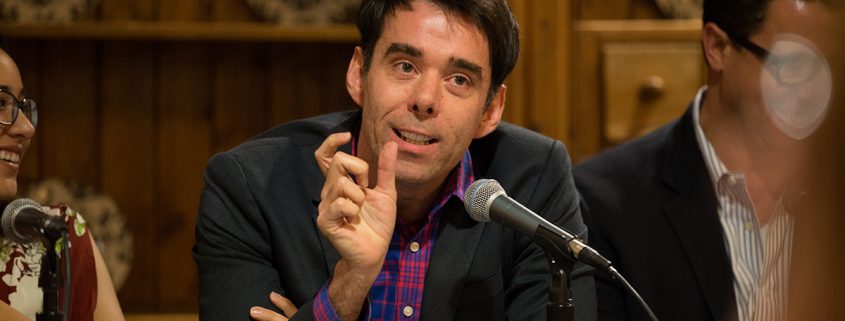Panel considers future of Trump presidency
Panelists discussed the aftermath of the 2016 presidential election and speculated about the next four years under a Donald Trump presidency at the “Road to the White House: Final Thoughts” event at the Davidson Conference Center on Tuesday evening.
Dan Schnur, director of the Jesse M. Unruh Institute of Politics, co-moderated the panel with Daily Trojan Editor-in-Chief Matt Lemas.
The panel featured: Tim Clark, Southwest U.S. political coordinator at Donald J. Trump for President; Brian Calle, vice president and opinion editor for The Orange County Register; Bill Burton, California managing director for SKDKnickerbocker; Wendy Greuel, a commissioner on the Los Angeles Homeless Services Authority’s Board of Commissioners; Ben Austin, board member for Students Matter; Mary Perez, vice president of the USC College Republicans; and Anthony Boulahoud, finance director for USC College Democrats.
“My interaction with Trump is fundamentally the interaction that you have with the CEO of an organization, and I believe that what you’re going to see from President Trump is a CEO,” Clark said. “My interaction has been with somebody who has a hunger for knowledge for this organization, someone who has a knowledge for what potential fixes are, is looking at data and making decisions.”
Calle conveyed more skepticism than Clark for the potential change the Trump presidency can bring.
“There is potential for Donald Trump to be a very good president; there is potential for Donald Trump to be a very bad president. There is potential for Donald Trump to be the last president,” Calle said jokingly. “But my sense of Donald Trump is this: I think [he] is going to moderate himself and measure himself a little bit. Donald Trump has a brand that people are familiar with, so I think Donald Trump is going to be Donald Trump.”
Calle added that Trump has already started to take a less brash approach to politics, a change from his campaign trail persona. For Calle, that is a positive sign of more changes to come.
Perez explained the need for Republicans and society as a whole to develop a more inclusive mindset.
“Going forward, we want to craft a message that says, ‘hey, we are the party for all people, for all Americans, we want to represent all minorities, all races, all religious practices, all sexual orientations,’” Perez said. “But, at the same time, we don’t want to lose sight of working class, white-collar Americans who came out for Mr. Trump and their interest in the equation too. They’re an important part of our electorate.”
Perez added that there needs to be an end to labelling those with conservative views as xenophobes, bigots and racists.
“I know that there are [xenophobic, bigoted and racist conservatives] out there, but if we can unify and work together without labeling people, that’s going to be the most constructive and important thing that we can do continuing forward,” Perez said.
Boulahoud emphasized the necessity of unity after the election and how the party should continue to strengthen.
“We need to move forward and we need to progress together. And we believe that means starting at the local level and working our way up,” Boulahoud said. “We probably need to lean more towards the center, so that we can bring people together. That’s probably the best thing to do.”
Greuel addressed the surge in hate crimes that have taken place in the aftermath of Trump’s victory.
“I think that Donald Trump is starting to stop the different things that are happening,” Greuel said. “[This is] a very critical time for our future and the diversity of our country to say we are a nation of a lot of people. When you get elected president of the United States you represent those that voted for you and those that did not vote for you,” Greuel said.


Concise. Balanced. Perfect. Great reporting, Sofia Bosch!